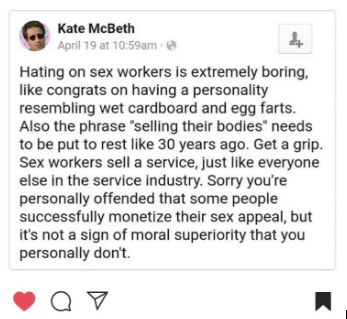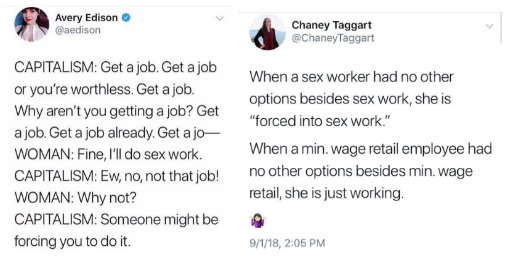
Here in the queer-verse, the acronym TERF is pretty widely understood. It stands for Trans-Exclusionary Radical Feminist. And while people who get called TERFs might regard it as a slur, it is, in actuality, an accurate description of their ideology. TERFs believe that trans women aren’t real women, and they think that trans women should be excluded from queer women’s spaces, which is harmful and invalidating.

In the sex work sphere, if someone is a TERF, it’s usually a good indication that they’ll likely be a SWERF too. SWERF stands for—you guessed it—Sex Work(er) Exclusionary Radical Feminists. Outside the sex work sphere, however, SWERF isn’t a word that you hear very often. Mainstream feminism contains elements of SWERF-iness that it is loath to unlearn, as demonstrated by everyone from cringe-worthy faux feminists Amy Schumer and Lena Dunham to political leaders like Kamala Harris, who came out in support of SESTA/FOSTA, or against sex work decriminalization.
So, if mainstream feminism is inundated with SWERF rhetoric, how can you recognize it and begin to unlearn it for yourself? To start with, here are some SWERF arguments debunked:
Sex work is “selling your body”

This is usually the first argument I hear from someone about why sex work is wrong or degrading. And it’s one that perplexes me because it doesn’t make any sense. Think about what that might mean: When you sell something, it changes hands; ownership of “it” (the product) changes. The idea of selling one’s body implies that one no longer has ownership of it—a dangerous idea, and one that has been used to justify violence against sex workers for centuries. But sex workers’ ability to consent to what they do with their bodies, with whom, and for how long, is just as inviolable as anyone else’s right to consent and bodily autonomy—an idea that is still, sadly, truly radical.
Not only that, but the sex that happens in some forms of sex work is not a “product” but a service. In a response to well-known mainstream feminist Jill Filopovic’s 2013 egregiously anti-sex work “world without patriarchy” piece, blogger Jadehawk delineates the difference between product and service as it applies to sex work:
“…sex [is not] something one ‘buys’, any more than one ‘buys’ car repair; sex is not a product, it’s a service. However, I see no reason to think that the idea of sex as a service will disappear just because the patriarchy did.”
Jadehawk cites several reasons why sex work would still be a sought-after service in a post-patriarchy feminist utopia world, some of which include: disparate sex drives between couples, kinks that someone wants fulfilled that their partner is uncomfortable doing, wanting to physically learn about sex in a safe and affirming atmosphere with a professional. And—oh yeah, fun.
Filopovic goes on to write that in her feminist utopia, places like McDonald’s and Walmart wouldn’t exist, either (though I’m unsure what their continued existence has to do with the presence or absence of feminism), to which Jadehawk responds:
“‘McDonalds’ and ‘Wal-Mart’are not equivalents to ‘sex work’, or even ‘prostitution’. McD and Wal-Mart are specific businesses; the equivalents to ‘sex work’ would be ‘food service’ and ‘retail’. Will neither of those two types of service work exist in this feminist utopia, either? Because if so, we’re back at ‘marxist feminist utopia’. But if so, why single out sex work? It would be abolishing doing anything for pay, altogether.”
Jadehawk’s final point here is an important one, though it is one that is often overlooked in the rush to pass misguided laws and policies that (fail to) crack down on sex trafficking while simultaneously hurting consensual sex workers: Why single out sex work? Sex trafficking, the go-to straw man argument for why SWERFs are anti-sex work, isn’t the only type of trafficking out there, after all. Labor trafficking is extensive, especially in the farming industry. Mainstream feminists are either ignorant of this fact or deliberately overlooking it, fixating on the “sex” part of the sex industry rather than the “work” part when it comes to understanding and advocating against coercion in the workforce.

Sex work is “easy money”
When the pearl-clutching around the “selling your body” argument fails to work, SWERFs often turn to another argument: that sex work is “easy money.” Not only is this argument condescending, it also shows a fundamental misunderstanding and ignorance of what sex work actually entails. As sex workers’ rights advocates are fond of—or perhaps tired of—hashtagging #sexworkisrealwork, it is an infuriatingly obvious statement that bears repeating again and again and yet again. WORK is in the title, and the work is work that feminists often agitate for recognition of, anyway, and that patriarchal society continues to devalue: care work and emotional labor.
Most feminists will agree that emotional labor—defined as “managing feelings and expressions to fulfill the emotional requirements of a job”—and jobs that require it are, overwhelmingly, jobs held by women and other marginalized folks. (Some of the jobs that Wikipedia lists as being specifically emotional labor-heavy include flight attendants, day care workers, social workers, teachers, and receptionists—all jobs that are generally coded as those held by women.) This work is difficult, and it can have serious physical and emotional repercussions: burnout, anxiety/depression, decreased job satisfaction, and even somaticized ailments (Franzosa, 2016; Xanthopoulou, 2017).
If sex work is a job that combines care work, emotional labor and manual labor (which it is!) as well as marketing and social media savvy, public relations, accounting and financial planning—because no one is in charge of your sex work 401(k) but you!—and security (made all the more difficult post SESTA/FOSTA) or involves the deeply unappealing act of supposedly “selling” your body, then how is it simultaneously “easy money”? As someone who’s been working in the sex industry for going on two years now, and who knows people who have been working for far longer, the misperception that sex work is “easy” is one I’ve literally never heard from sex workers. Occasionally fun? Sometimes (but not always!) empowering? Sure. Creative and independent? Definitely. But easy? Get outta town.
Sex workers must have been abused to do the work we do
I’m dishearteningly used to men at the club asking me —with absolutely no awareness of how invasive and horrifying such a question is—if I was abused as a kid, and is that what led me to become a stripper. Mainstream culture makes light of the idea of “daddy issues,” using the concept of trauma as a punchline rather than extending empathy and validation toward those who have experienced betrayal at the hands of people responsible for keeping them safe and cared for. It’s disgusting, and it’s even more abhorrent when I hear so-called feminists using the same rhetoric with regard to the sex work community.
First of all, making assumptions about someone’s trauma history is gross. Don’t do it. Making assumptions about an entire community’s trauma history? That truly makes you look like a jerk. While it’s true that some sex workers have had histories of trauma in their past, guess what? So have an overwhelming number of people in the non-sex working population! Our cisgender, heteronormative, patriarchal, misogynistic, white supremacist capitalist society is inherently violent. And it is structured so that sex workers, particularly BIPOC trans and queer sex workers, are at extremely elevated risk of such violence. The fact that sex workers, as a community, do experience higher rates of violence is because we are more vulnerable to it due to our position in such a toxic social hierarchy. But just because those two things correlate does not imply that one (abuse) causes the other (decision to become a sex worker).
Sex workers “spread disease”
The basis of this statement is rooted in history when sex workers or those suspected of being sex workers were subjected to testing and treatment for venereal diseases upon their arrest or as a requirement of their release. This dehumanizing and coercive practice was fought by Margo St. James and COYOTE (Call Off Your Old Tired Ethics, more on them in future columns!) in the 1970s and helped to “[end] some of the worst human rights’ abuses” and infringement of bodily autonomy for women and transgender sex workers, though the success of these efforts was limited to only a few cities and remained a “fragile” victory (Chateuvert, 2014). (And tellingly, it was only sex workers who were subjected to such practices, not male clients who were also arrested.)
Sex workers work with their bodies and are quite often more knowledgeable about safer sex practices than clients, who are the ones pushing for “raw” sex or may feel insulted when a sex worker insists on using lube, for example.
While it must be acknowledged that access to health care, STI testing and treatment varies based on complicated interactions between one’s identity and health disparities based on race, gender, class and location (as well as on the United States abysmal health care system), it should be obvious that sex workers have a vested interested in their own health and in utilizing safer sex practices. For example, when California legislators were pushing for mandatory condom use regulations in the porn industry, porn star Kayden Kross protested on the grounds that “[porn stars are] the most tested population in the world. We are more aware of our bodies than anyone else.”
Sex workers have low self-esteem, no respect for themselves, and can’t be feminists

I could write a whole other column devoted to this one argument (and maybe I will), but suffice it to say that since I started stripping, my patience for indulging men who waste my time, invade my space and take advantage of my generosity and kindness has dropped to far, far less than zero. To be sure, I have had an extremely privileged experience within the sex industry. But it is ludicrous to suggest that sex workers don’t respect ourselves because of the work we do. While capitalism tries to get us to believe that our worth as human beings is tied to our work and our productivity within that work—and sex work, like any other industry, operates within a capitalist system—so, so many of the individual sex workers I know approach their various jobs within the sex industry with incisive wit and boundless confidence.
We have to love ourselves because so many people in the non-sex working world seem to be intent on hating and deriding us. And while it’s not a job requirement, almost all the sex workers I know are fierce advocates for social justice and sexual liberation, and many are extremely aware or are working to become more aware, of their position within the community with regard to privilege and power. Maybe I’m just lucky to be surrounded by incredible people, but I think it’s more likely that sex workers are a self-selecting group of incredibly wise, warm, kind, generous and righteous folks who are dedicated to seeing the world become a better, more inclusive, open-minded and accepting place. Does that sound like low self-esteem to you?

What Do You Think?